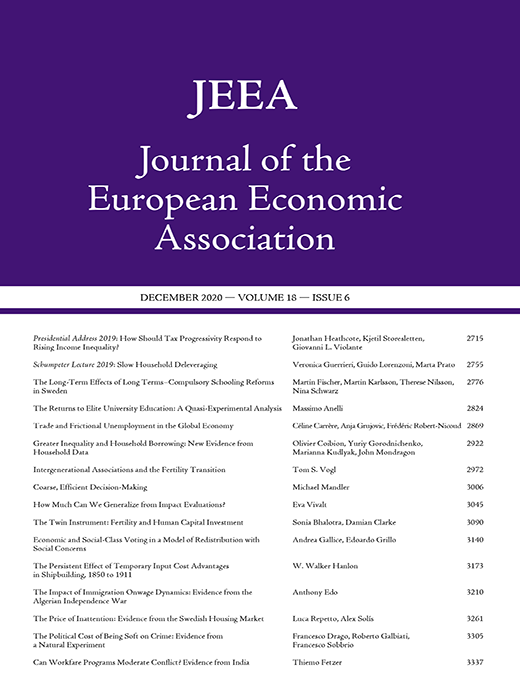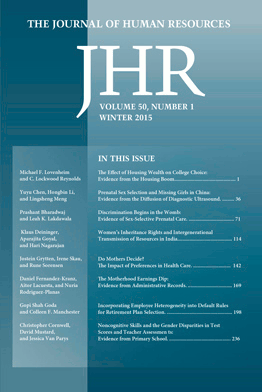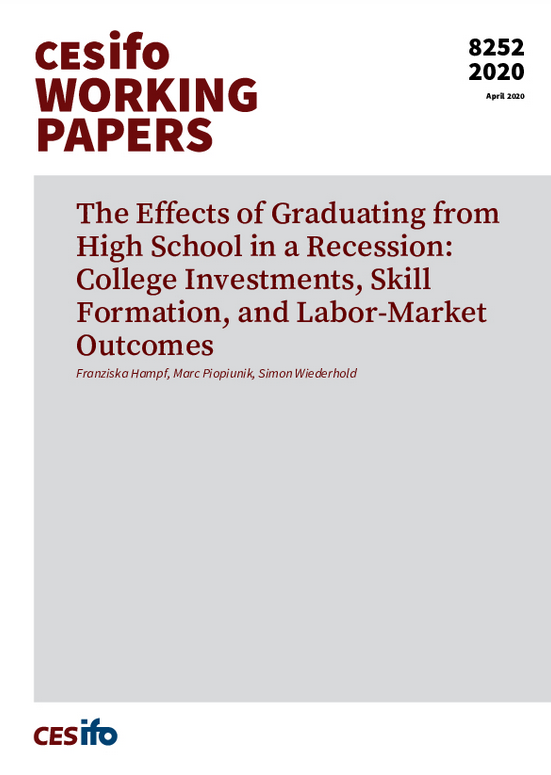Bildung, Kompetenzen und Arbeitsmarkt
Die Forschungsgruppe erforscht die Entstehung und die Auswirkungen von Kompetenzen. Als wesentliche Bestimmungsfaktoren für die Entwicklung von Kompetenzen untersucht die Gruppe insbesondere den familiären Hintergrund, schulische Bildung und Weiterbildung am Arbeitsplatz. Effekte höherer Kompetenzen auf den Arbeitsmarkterfolg werden über die gesamte berufliche Laufbahn hinweg analysiert. Außerdem beschäftigt sich die Gruppe mit Veränderungen in der Nachfrage nach Kompetenzen infolge von technologischem und strukturellem Wandel.
Forschungscluster
Produktivität und InstitutionenIhr Kontakt

- Abteilung Strukturwandel und Produktivität
Referierte Publikationen

International Emigrant Selection on Occupational Skills
in: Journal of the European Economic Association, Nr. 2, 2021
Abstract
<p>We present the first evidence on the role of occupational choices and acquired skills for migrant selection. Combining novel data from a representative Mexican task survey with rich individual-level worker data, we find that Mexican migrants to the United States have higher manual skills and lower cognitive skills than nonmigrants. Results hold within narrowly defined region–industry–occupation cells and for all education levels. Consistent with a Roy/Borjas-type selection model, differential returns to occupational skills between the United States and Mexico explain the selection pattern. Occupational skills are more important to capture the economic motives for migration than previously used worker characteristics.</p>

The Value of Smarter Teachers: International Evidence on Teacher Cognitive Skills and Student Performance
in: Journal of Human Resources, Nr. 4, 2019
Abstract
<p>We construct country-level measures of teacher cognitive skills using unique assessment data for 31 countries. We find substantial differences in teacher cognitive skills across countries that are strongly related to student performance. Results are supported by fixed-effects estimation exploiting within-country between-subject variation in teacher skills. A series of robustness and placebo tests indicate a systematic influence of teacher skills as distinct from overall differences among countries in the level of cognitive skills. Moreover, observed country variations in teacher cognitive skills are significantly related to differences in women’s access to high-skill occupations outside teaching and to salary premiums for teachers. </p>

Do Smarter Teachers Make Smarter Students?
in: Education Next, Nr. 2, 2019
Abstract
<p>Student achievement varies widely across developed countries, but the source of these differences is not well understood. One obvious candidate, and a major focus of research and policy discussions both in the United States and abroad, is teacher quality.</p>

Africa’s Skill Tragedy
in: Journal of Human Resources, Nr. 3, 2018
Abstract
<p>We study the importance of teacher subject knowledge for student performance in Sub-Saharan Africa using unique international assessment data for sixth-grade students and their teachers. To circumvent bias due to unobserved student heterogeneity, we exploit variation within students across math and reading. Teacher subject knowledge has a modest impact on student performance. Exploiting vast cross-country differences in economic development, we find that teacher knowledge is effective only in more developed African countries. Results are robust to adding teacher fixed effects and accounting for potential sorting based on subject-specific factors.</p>

Skills, Earnings, and Employment: Exploring Causality in the Estimation of Returns to Skills
in: Large-scale Assessments in Education, Nr. 12, 2017
Abstract
<p>Ample evidence indicates that a person’s human capital is important for success on the labor market in terms of both wages and employment prospects. However, unlike the efforts to identify the impact of school attainment on labor-market outcomes, the literature on returns to cognitive skills has not yet provided convincing evidence that the estimated returns can be causally interpreted. Using the PIAAC Survey of Adult Skills, this paper explores several approaches that aim to address potential threats to causal identification of returns to skills, in terms of both higher wages and better employment chances. We address measurement error by exploiting the fact that PIAAC measures skills in several domains. Furthermore, we estimate instrumental-variable models that use skill variation stemming from school attainment and parental education to circumvent reverse causation. Results show a strikingly similar pattern across the diverse set of countries in our sample. In fact, the instrumental-variable estimates are consistently larger than those found in standard least-squares estimations. The same is true in two “natural experiments,” one of which exploits variation in skills from changes in compulsory-schooling laws across U.S. states. The other one identifies technologically induced variation in broadband Internet availability that gives rise to variation in ICT skills across German municipalities. Together, the results suggest that least-squares estimates may provide a lower bound of the true returns to skills in the labor market.</p>
Arbeitspapiere

The Effects of Graduating from High School in a Recession: College Investments, Skill Formation, and Labor-Market Outcomes
in: CESifo Working Paper, Nr. 8252, 2020
Abstract
<p>We investigate the short- and long-term effects of economic conditions at high-school graduation as a source of exogenous variation in the labor-market opportunities of potential college entrants. Exploiting business cycle fluctuations across birth cohorts for 28 developed countries, we find that bad economic conditions at high-school graduation increase college enrollment and graduation. They also affect outcomes in later life, increasing cognitive skills and improving labor-market success. Outcomes are affected only by the economic conditions at high-school graduation, but not by those during earlier or later years. Recessions at high-school graduation narrow the gender gaps in numeracy skills and labor-market success.</p>












